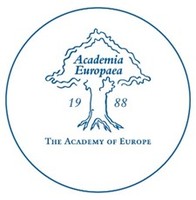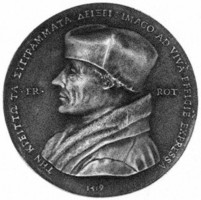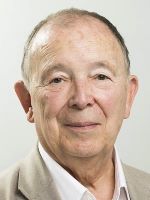2023 Heinz-Nixdorf –Academia Europaea ERASMUS LECTURE


https://en.wikipedia.org › wiki › Jean-Pierre_Changeux
Jean-Pierre Changeux - Communications cellulaires
Collège de France
https://www.college-de-france.fr
----------------------------------------------------------------------------------------------------------------------
TITLE OF THE 2023 HEINZ-NIXDORF LECTURE
“The brain as a chemical machine: importance of allosteric receptors”
----------------------------------------------------------------------------------------------------------------------
Abstract
The human brain, the most complex organ of the body, cannot be simply regarded as an electrical machine or a mechanical computer. Understanding the chemistry of the brain is a prerequisite for the understanding if its basic functions - from the intercellular communications up to the higher cognitive level - together with their pathological alterations. The billions of neurons in the brain make discontinuous networks that are bound together by chemical signals: the neurotransmitters. There are over a hundred of neurotransmitters that mediate information processing in the brain, and thus, all the operations it performs. The discovery of the molecules and molecular mechanisms involved in the signal transduction elicited by neurotransmitters has thus created a “paradigmatic change” in the history of brain sciences leading to considerable progress in the understanding of drugs action in the brain, their possible side effects and among them drug addiction with its known devastating consequences at the social level, and, most of all, their potential therapeutic action.
At the early stages, a critical role was played by the concept of allostery to qualify the interaction between topographically distinct sites on regulatory proteins - ie an active site and a regulatory site - and its mediation by a conformational change of the molecule (1961). Through their cooperative organisation, allosteric proteins would behave as “molecular switches” (1965). Early on the concept was extended to brain communications and the receptors for neurotransmitters (1964,1967). Then, the first neurotransmitter receptor was identified (1970): the nicotinic acetylcholine receptor. It was soon demonstrated to be a bona fide allosteric protein carrying several binding sites for the neurotransmitter acetylcholine, an ion channel, together with multiple allosteric modulatory sites. The elucidation, today at the atomic level, of the allosteric mechanism through which drugs modulate receptor efficacy opens revolutionary new avenues in the field of drug discovery.
Moreover, the multiple regulations to which acetylcholine receptors have access – together with thousands of subsequently discovered receptors in the brain – further extends the “paradigmatic change” to neuronal brain circuits in general, to their contribution to the short and long-term synaptic changes (ie those engaged in learning and memory), up to higher cognitive functions and - last but not least – to conscious processing. The consequences in the understanding neuropsychiatric diseases and their therapeutics are immense.
Biography
JEAN-PIERRE CHANGEUX is Emeritus Professor at the Collège de France & Pasteur Institute Paris. His main contributions and discoveries in the course of the past 50 years are centered on the general theme of receptors and their allosteric transitions, primarily in the nervous system with consequences ranging from the understanding of drug addiction to the therapeutics of neuropsychiatric diseases.
JPC was trained at Ecole Normale Supérieure (rue d'Ulm, Paris) (1955) and Institut Pasteur (1959) and received a PhD at Paris University (1964); he was postdoctoral fellow, at Universiy of California, Berkeley, (1965-1966), visiting Assistant Professor at Columbia University College of Physicians & Surgeons, New-York (1966-1967) ; Sous-Directeur, Collège de France, Paris (1967) ; Director of the Unit of Molecular Neurobiology, Institut Pasteur, Paris, 1972-2006 ; Professor Collège de France, 1975-2006 ; Professor Institut Pasteur, 1975-2006, emeritus since 2007 ; Skaggs distinguished visiting professor in Pharmacology, University of California San Diego (2008-2012); International Faculty, Kavli Institute for Brain & Mind, University of California San Diego (2012-2022).
JPC has authored or co-authored several books for a non-specialist audience notably, Neuronal Man: The Biology of The Mind in 1983/1985, Conversations on Mind Matter and Mathematics with the mathematician Alain Connes (1998), What Makes Us Think with the moral philosopher Paul Ricoeur (2002), Physiology of truth (2005),The Enchanted Neurons with the musical composers P.Boulez and P.Manoury (2019, Le beau et la splendeur du Vrai interview with François L’Yvonnet (2023).
Jean-Pierre Changeux’s academic accolades include the Gairdner foundation award 1978, the Wolf prize 1983, the Louis Jeantet Prize for Medicine 1993, the Balzan Prize 2001, the National Academy of Sciences Award in Neurosciences USA 2007, the Olav Thon international research award in biomedicine, Oslo, Norway, 2016, the Albert Einstein World Award of Science, Hong Kong, 2018 and Clarivate citation laureate in Physiology and Medicine for 2021.
----------------------------------------------------------------------------------------------------------------------
The Award and lecture is sponsored by the Heinz-Nixdorf Stiftung

Further information about the Heinz-Nixdorf Stiftung can be found at:
http://www.heinz-nixdorf-stiftung.de
Downloads
- Erasmus Medal 2022: Jean-Pierre Changeux (291 KByte)


